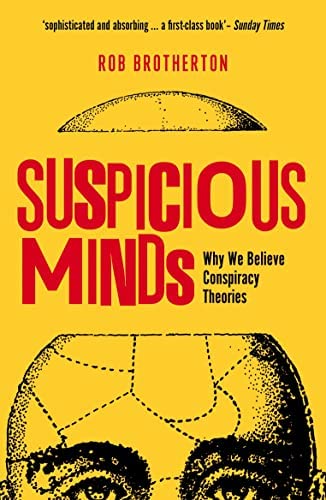Newly released
This book is new and will be uploaded as soon as it becomes available to us and if we secure the necessary publishing rights.

Suspicious Minds: Why We Believe Conspiracy Theories Book PDF
(0)
Author:
Rob BrothertonNumber Of Reads:
56
Language:
English
Category:
Social sciencesSection:
Pages:
301
Quality:
excellent
Views:
720
Quate
Review
Save
Share
Book Description
We're all conspiracy theorists. Some of us just hide it better than others.
Conspiracy theorists do not wear tin-foil hats (for the most part). They are not just a few kooks lurking on the paranoid fringes of society with bizarre ideas about shape-shifting reptilian aliens running society in secret. They walk among us. They are us.
Everyone loves a good conspiracy. Yet conspiracy theories are not a recent invention. And they are not always a harmless curiosity. In Suspicious Minds, Rob Brotherton explores the history and consequences of conspiracism, and delves into the research that offers insights into why so many of us are drawn to implausible, unproven and unproveable conspiracy theories. They resonate with some of our brain's built-in quirks and foibles, and tap into some of our deepest desires, fears, and assumptions about the world.
The fascinating and often surprising psychology of conspiracy theories tells us a lot – not just why we are drawn to theories about sinister schemes, but about how our minds are wired and, indeed, why we believe anything at all. Conspiracy theories are not some psychological aberration – they're a predictable product of how brains work. This book will tell you why, and what it means.
Of course, just because your brain's biased doesn't always mean you're wrong. Sometimes conspiracies are real. Sometimes, paranoia is prudent.
Rob Brotherton
Rob Brotherton is an academic psychologist and science writer who likes to walk on the weird side of psychology. His first book, Suspicious Minds: Why We Believe Conspiracy Theories, was shortlisted for a British Psychological Society Book Award. Rob completed a PhD on the psychology of conspiracy theories at Goldsmiths, University of London, funded by the Economic and Social Research Council. After a time lecturing at Goldsmiths, he moved to New York City, where he researches and teaches political psychology, among other things, at Barnard College, Columbia University.
Book Currently Unavailable
This book is currently unavailable for publication. We obtained it under a Creative Commons license, but the author or publisher has not granted permission to publish it.
Rate Now
5 Stars
4 Stars
3 Stars
2 Stars
1 Stars
Suspicious Minds: Why We Believe Conspiracy Theories Quotes
Top Rated
Latest
Quate
Be the first to leave a quote and earn 10 points
instead of 3
Comments
Be the first to leave a comment and earn 5 points
instead of 3